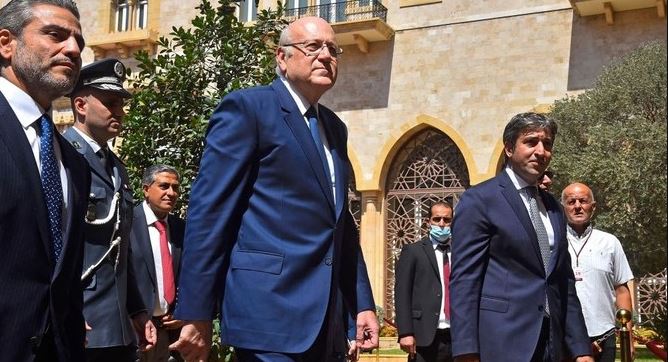BEIRUT: Lebanese President Michel Aoun will hold binding consultations with members of the country’s recently elected parliament to name a new prime minister on June 23.
Caretaker PM Najib Mikati is widely seen as the front-runner for the post.
Once named, the new prime minister must form a government, a process that often takes several months.
However, the incoming government will last for only four months, as its term will end with the completion of the presidential term in October.
After Saad Hariri, leader of the Future Movement, declared the suspension of his political career and that of his party, political groups began looking for a Sunni figure who could be nominated to head the new government.
By convention, the prime minister of Lebanon is a Sunni Muslim.
Independent Sunni MP Abdul Rahman Al-Bizri told Arab News that the nomination of a new premier is still underway and talks are taking place between various groups “to reach a formula that is relieving for Lebanon.”
He said: “We are living through tough times and the traditional political forces tend to renominate the caretaker Prime Minister Najib Mikati.”
A political observer said that this week might witness political deals to form the government due to “the weakness of the Sunnis in the political equation.”
A meeting on Wednesday between the Grand Mufti of Lebanon Abdullatif Darian and Saudi Ambassador to Lebanon Walid Bukhari assumed special significance as it coincided with the launch of the process to nominate the new premier.
Bukhari highlighted “the important role of the grand mufti in strengthening the unity of the Lebanese and Islamic stance, especially during the hard times Lebanon is passing through.”
He said that Saudi Arabia hopes to see the “unity of the people of Lebanon in front of the challenges that it is facing,” and praised the efforts of the mufti to guarantee national unity and ensure civil peace in the country.
Doubts remain over how the parliamentary blocs will handle the process of nominating the new premier. Until now there has been no agreement among the opposition forces on any nominee, and there is no guarantee Mikati will be renominated despite the fact that he is the clear favorite.
MP Ibrahim Mneimneh told Arab News: “Lawmakers from the ‘Together Toward Change’ list did not form a unified bloc. However, they are making contacts and consultations to reach a unified stance. We want a nonpolitical figure who has a program that fits the new era and whose government can bring in reforms, the most important thing for Lebanon.”
Those who do not want a premier with these qualifications “will take the country into the unknown,” Mneimneh said.
“They have proven that they are irresponsible people who have led the country to ruins.”
The MP said that the minimum expected from the new government is to introduce economic reforms in accordance with the demands of the International Monetary Fund.
“There is a possibility that we do not elect a new president in due time. Hence, the term of the government might get extended,” he said.
However, former governments whose heads were nominated by Hezbollah and its allies failed, and disagreements developed between its ministers despite the fact that they were from the same side. This is what happened with the Mikati government whose call was “together for salvation.”
In a recent interview, Gebran Bassil, head of the Free Patriotic Movement, criticized Mikati over his refusal to grant Bassil’s party the energy portfolio in the new government.

